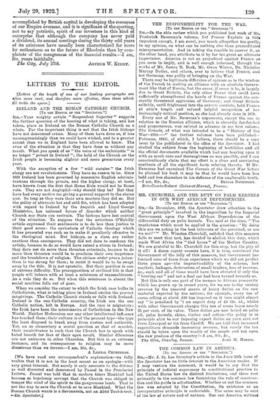MM. CHURCHILL AND THE DUTY ON PALM KERNELS IN OUR
WEST AFRICAN DEPENDENCIES. [To ME EDITOR Or THE " SPECTATOR.") Sin,—In December, 1919, the Spectator drew attention to the "great principle" involved in the imposition by the Imperial Government upon the West African Dependencies of the differential duty on palm kernels. You said at the time, " The touchstone which must be applied is the question : By doing this are we acting in the best interests of the governed, or are we not? " Mr. Winston Churchill, satisfied that this measure fails to meet that test, has decided to abolish this duty, which made West Africa the "tied house" of the Mother Country. We are grateful to Mr. Churchill for this step, but the pity of it all! A dozen cogent reasons have, it is true, convinced the Government of the folly of this measure, but Government has learned none of these from experience which we did not predict three years ago—the impracticability of the scheme, lost markets, leakages, destruction of email traders, loss of revenue, &c., each and all of these would have been obviated if only the "hearing ear" and not a deaf ear had been turned towards us.
But this is only one part of the menace to African prosperity which has grown up in recent years, for we are to-day raising revenue by the unsound means of heavy duties on the raw material exported by the natives; for example, every ton of cocoa selling at about £40 has imposed on it (one might almost say " is penalized by ") an export duty of £4 13s. 4d., whilst with other Government charges this ton of cocoa bears nearly 25 per cent. of its value. These duties are now levied on palm oil, palm kernels, skins, timber and cotton—the policy is in principle akin to our imposing export duties on yarn sent out from Liverpool or tin from Cardiff. We are told that increased expenditure demands increasing revenue, but surely the tax should be taken upon the wealth of the people and not upon the raw produce of the country !—I am, Sir, &c.,


































 Previous page
Previous page